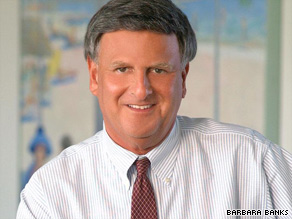Commentary: America on a collision course
- Story Highlights
- Bob Greene: Antagonists in politics are primed for confrontation
- Greene says in retrospect that 2008 presidential campaign seems relatively tranquil
- He says one way to make progress is to stop the partisan shouting
- Greene: Maybe there's too much anger, noise to calm the debate
CNN Contributor
Editor's note: CNN contributor Bob Greene is a best-selling author whose new book is "Late Edition: A Love Story."

Bob Greene says extreme voices from the left and right are dominating the political atmosphere.
(CNN) -- There's a standard scene in old movies about young hotheads behind the wheels of fast cars.
It's the scene where the two lead actors play chicken.
Each wants to prove that he's the one who won't back down.
So they aim their cars at each other head-on and step on the gas, wanting to find out who will be the first to swerve.
The climax is almost always disastrous. The moral of the story is that the carnage could have been avoided.
Which brings us to our current ugly political atmosphere.
Who would ever have guessed that we would be looking back at the presidential campaign of 2008 as a time of relative tranquillity and good fellowship?

It sure didn't seem like that while it was going on. The campaign felt rough, mean, take-no-prisoners.
Yet the public discourse during last year's campaign seems downright civil compared with what we're in the midst of now. Lines have not just been drawn in the sand -- they've been bolted down and reinforced with triple-layered steel. Loudest and most belligerent voice prevails. All the promises from both ends of the political spectrum, about trying to find common ground and shared ideals, seem at times to have been discarded like so many obsolete campaign buttons.
At the height of the Barack Obama-John McCain race last fall, I decided to conduct an experiment as I traveled around the nation.
As I met people, I would ask them which candidate they were for. Then I would request of them:
"Say something good about the other guy."
At first they would think it was a trick question. But that wasn't the intention.
Don't Miss
So Dave Fiala, 47, of Howells, Nebraska, a strong supporter of Obama, thought for a few seconds about McCain and then said:
"What that man has been through -- his war record in the military -- how could anyone not respect that? ... He genuinely believes that what he wants to do for the country is the right thing. But mostly I come back to how he handled terrible adversity. ... I'm not going to vote for him, but he's a man I would enjoy meeting and talking to."
Mike Cohany, 45, of Carlisle, Pennsylvania, was solidly for McCain. Yet when I asked him to say something good about Obama, he paused and then said:
"He's energetic, he's charismatic, he's fresh, and it's clear that he believes things can improve. He's very poised in how he carries himself, and there's no question he's very intelligent. ... He's not going to get my vote, but, now that you ask, I think he's a guy I would enjoy having a conversation with."
People seemed to welcome this exercise -- the refreshing challenge of acknowledging admirable qualities in the politician they disagreed with.
Somehow, it feels that a similar experiment would be doomed to failure now. Even though many citizens tell pollsters that they favor moderation, the needle of public acrimony seems permanently stuck in the red zone. To ask Americans on opposite ends of the political divide to find laudable qualities in each others' positions. ...
Well, lately it feels like we're all in one of those old hot-rod movies, jamming the accelerator to the floor, speeding straight toward each other's headlights.
What to do about it?
One answer may be found in an unlikely place -- in words spoken by the most divisive political figure of his era.
Richard Nixon, in his first inaugural address during a time of widespread public rage in the United States, talked about "reaching with magnificent precision for the moon, but falling into raucous discord on earth."
Nixon's presidency would end in shambles. But on its first day, here is what he said about how to soothe the anger that was consuming the nation:
"To find that answer, we need only look within ourselves. ... To lower our voices would be a simple thing."
Some people's feelings about Nixon undoubtedly cloud their opinion of everything he ever did. Yet what he said as he took office in a time of nonstop partisan conflict is worth considering as we pass through similar days:
"In these difficult years, America has suffered from a fever of words; from inflated rhetoric that promises more than it can deliver; from angry rhetoric that fans discontents into hatreds; from bombastic rhetoric that postures instead of persuading.
"We cannot learn from one another until we stop shouting at one another -- until we speak quietly enough so that our words can be heard as well as our voices."
But maybe that has become impossible. The pedals are mashed against the floorboards now, and our engines are roaring too loudly for any calming voice to be heard. We seem to be approaching the bad part of the movie. The part where we find out that no one wins.
The opinions expressed in this commentary are solely those of Bob Greene.
All About Barack Obama • John McCain
 Sit tight, we're getting to the good stuff
Sit tight, we're getting to the good stuff